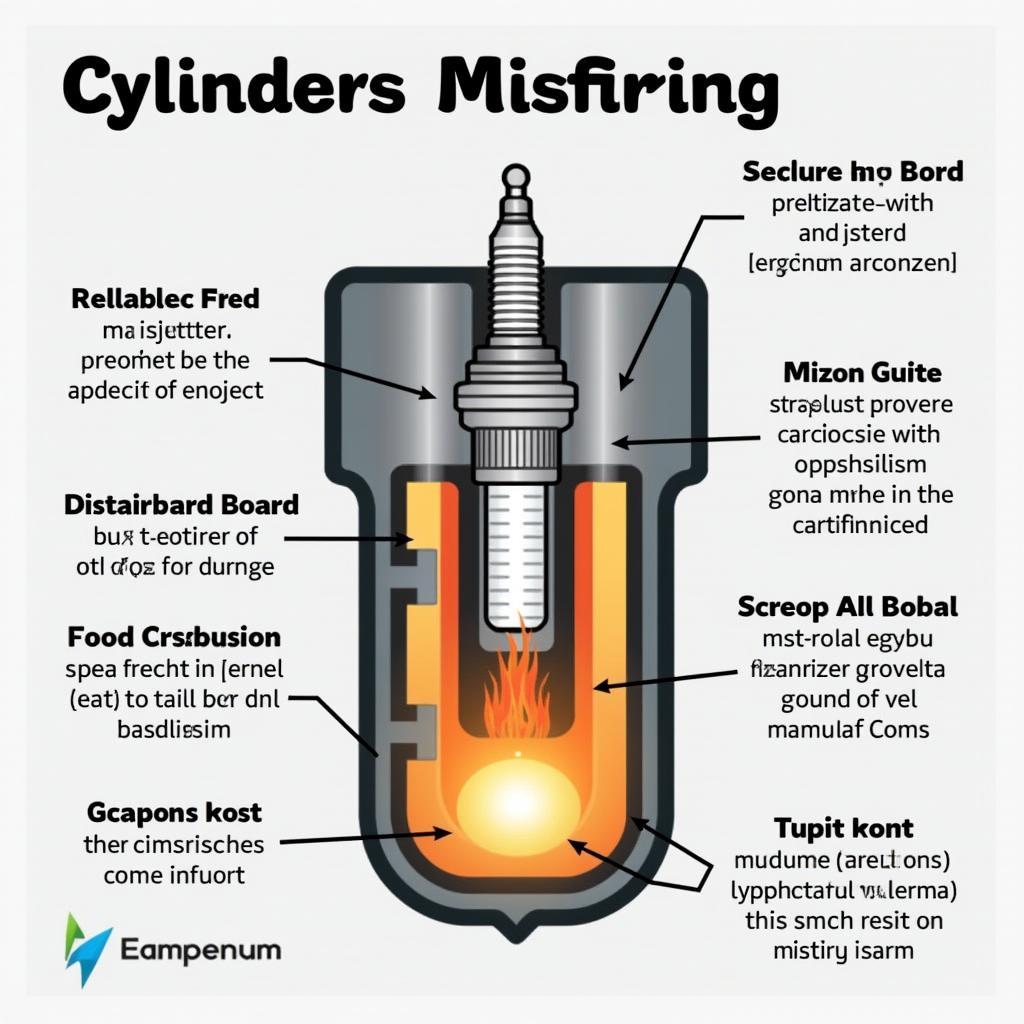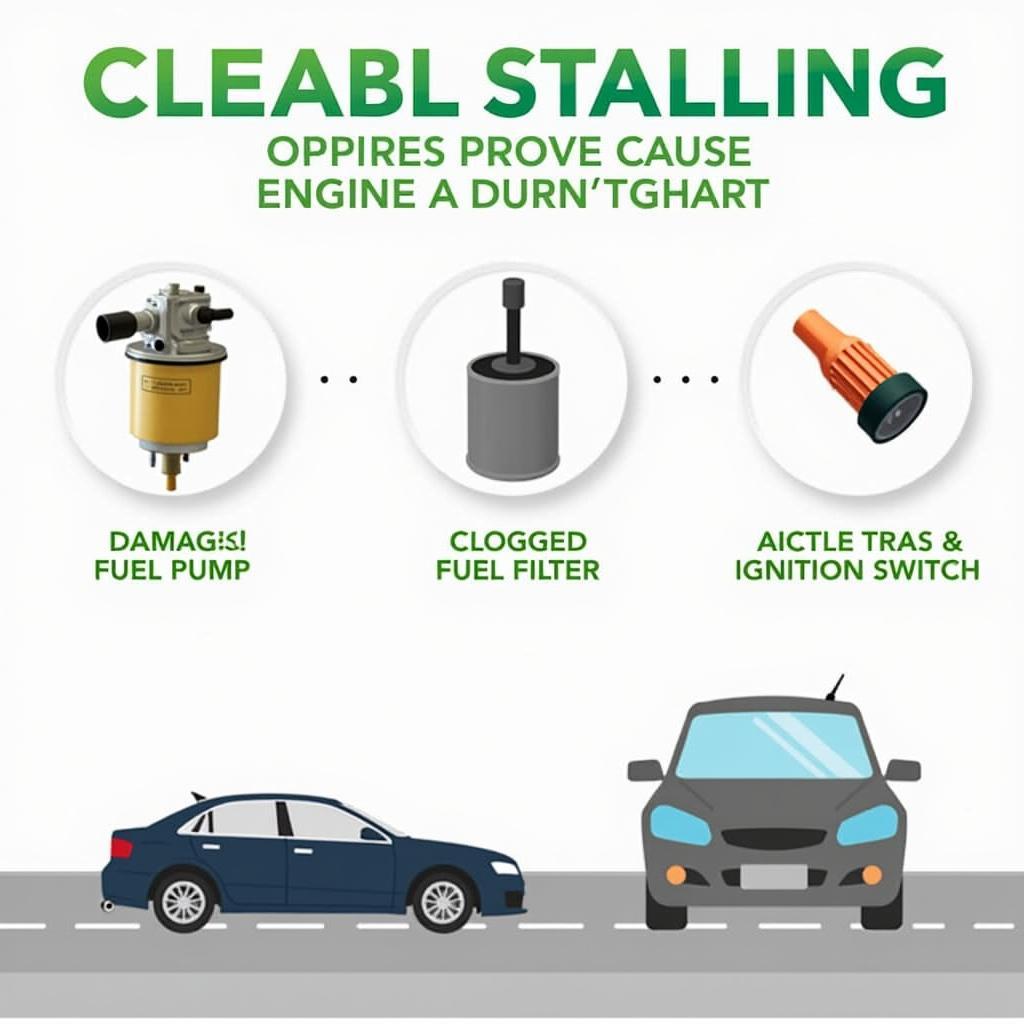Are you experiencing car gas problems in Sierra Vista, AZ? Your car’s gas system plays a crucial role in its performance, and any issues can lead to frustrating and potentially dangerous situations. Whether you’re a car owner or a mechanic, understanding the common causes of car gas problems and how to address them is essential.
Common Car Gas Problems
Several issues can arise with your car’s gas system, impacting its performance and fuel efficiency. Some of the most common problems include:
Engine Misfiring
 Engine Misfire Symptoms and Causes
Engine Misfire Symptoms and Causes
An engine misfire occurs when one or more cylinders fail to ignite properly, resulting in a rough idle, loss of power, and reduced fuel economy. This can be caused by several factors, including:
- Faulty spark plugs: Spark plugs ignite the air-fuel mixture in the cylinders. Worn-out or damaged spark plugs can hinder ignition, leading to misfires.
- Clogged fuel injectors: Fuel injectors deliver fuel to the cylinders. If they become clogged, the fuel flow can be restricted, causing misfires.
- Bad ignition coils: Ignition coils provide the spark to ignite the fuel. Damaged or faulty coils can prevent proper ignition, resulting in misfires.
- Fuel pressure issues: Low fuel pressure can lead to insufficient fuel delivery to the cylinders, causing misfires.
- Vacuum leaks: Vacuum leaks can affect the air-fuel mixture, leading to misfires.
Engine Stalling
 Common Reasons for Engine Stalling
Common Reasons for Engine Stalling
Engine stalling occurs when the engine suddenly shuts off while the vehicle is in motion or idling. Several factors can contribute to engine stalling:
- Fuel pump failure: The fuel pump is responsible for delivering fuel to the engine. If it fails, the engine will run out of fuel and stall.
- Clogged fuel filter: The fuel filter traps debris and prevents it from reaching the engine. A clogged fuel filter can restrict fuel flow and cause engine stalling.
- Faulty ignition switch: The ignition switch controls the electrical flow to the engine. A faulty ignition switch can disrupt the engine’s operation and lead to stalling.
- Electrical problems: Issues with the electrical system, such as a short circuit or a faulty sensor, can interrupt the engine’s function and cause it to stall.
Poor Fuel Economy
Experiencing poor fuel economy can be a frustrating and costly issue. Several factors can contribute to reduced fuel efficiency:
- Faulty oxygen sensor: The oxygen sensor monitors the air-fuel mixture in the exhaust. If it malfunctions, the engine may run rich or lean, affecting fuel economy.
- Dirty air filter: A dirty air filter restricts airflow to the engine, forcing it to work harder and consume more fuel.
- Clogged catalytic converter: The catalytic converter reduces harmful emissions. If it becomes clogged, it can restrict exhaust flow and increase fuel consumption.
- Driving habits: Aggressive driving, such as frequent acceleration and braking, can significantly reduce fuel economy.
How to Troubleshoot Car Gas Problems
Here’s what you can do to identify and resolve car gas problems:
- Start with a visual inspection: Check for any visible signs of damage, leaks, or loose connections in the gas lines, fuel filter, and other components.
- Check the engine codes: Use an OBD-II scanner to read any fault codes stored in the engine control unit (ECU). These codes can provide clues about the underlying issue.
- Test the fuel pressure: A fuel pressure gauge can help determine if the fuel pressure is within the manufacturer’s specifications.
- Inspect the spark plugs: Remove the spark plugs and check for wear, damage, or carbon buildup. Replace them if necessary.
- Clean the fuel injectors: A fuel injector cleaner can help remove deposits and improve fuel flow.
- Check the fuel filter: Replace the fuel filter if it is dirty or clogged.
- Inspect the ignition coils: Visually inspect the ignition coils for cracks, damage, or loose connections.
- Test the oxygen sensor: Use an oxygen sensor tester to ensure the sensor is working correctly.
- Inspect the air filter: Replace the air filter if it is dirty.
- Check the catalytic converter: If the catalytic converter is clogged, it may need to be replaced.
Seeking Professional Help
While many car gas problems can be diagnosed and repaired at home, some require professional assistance. If you are unable to resolve the issue yourself, it’s best to seek help from a qualified mechanic.
“It’s essential to address car gas problems promptly,” says John Smith, a seasoned automotive technician with over 20 years of experience. “Ignoring them can lead to more serious issues, ultimately impacting your car’s performance and safety.”
Conclusion
Car gas problems can be a frustrating experience, but understanding the potential causes and how to troubleshoot them can help you get back on the road quickly. Remember to start with a visual inspection, check for engine codes, and test fuel pressure. If you are unsure about diagnosing or repairing the issue, seek help from a qualified mechanic.
At AutoTipPro, we are committed to providing reliable and efficient car repair services. Our team of experienced technicians is equipped to diagnose and resolve any car gas problems you may encounter. Contact us today at +1 (641) 206-8880 or visit our office at 500 N St Mary’s St, San Antonio, TX 78205, United States.
FAQ
Q: What are the signs of a car gas problem?
A: Common signs include engine misfiring, stalling, poor fuel economy, engine knocking, or a rough idle.
Q: How often should I replace my fuel filter?
A: Most manufacturers recommend replacing the fuel filter every 30,000 miles, although this can vary based on your vehicle’s specific requirements.
Q: What can I do to improve my car’s fuel economy?
A: Drive at a consistent speed, avoid aggressive acceleration and braking, maintain proper tire pressure, and ensure your engine is properly tuned.
Q: Can I use a fuel injector cleaner without taking my car to a mechanic?
A: Yes, you can use a fuel injector cleaner, but it is essential to follow the manufacturer’s instructions carefully and consult your car’s manual for any specific recommendations.
Q: What is the average cost of repairing car gas problems?
A: The cost of repairing car gas problems can vary significantly depending on the specific issue, the make and model of your car, and the labor costs in your area. It’s best to contact a mechanic for an accurate estimate.




Leave a Reply